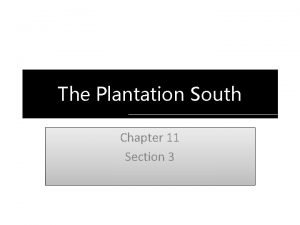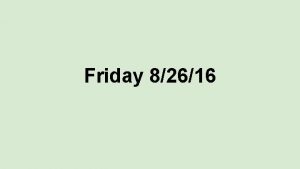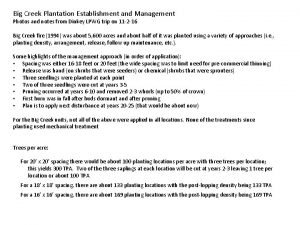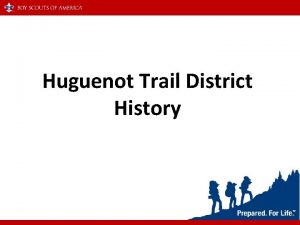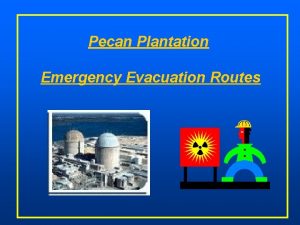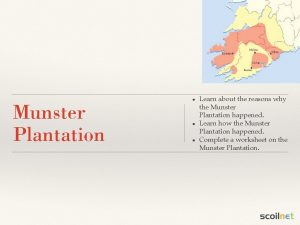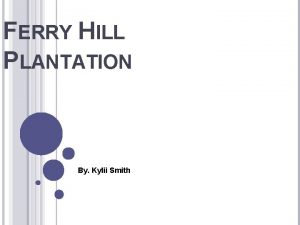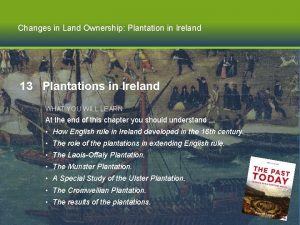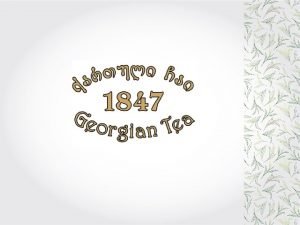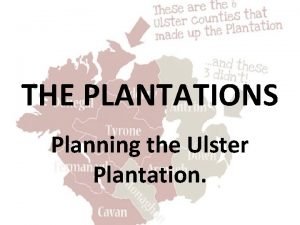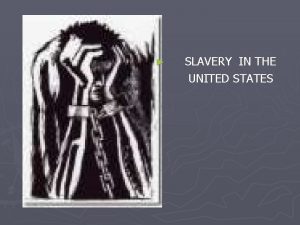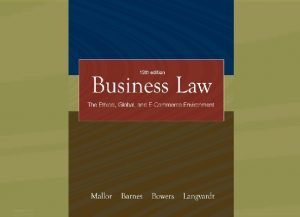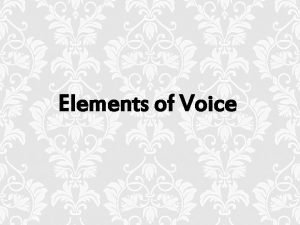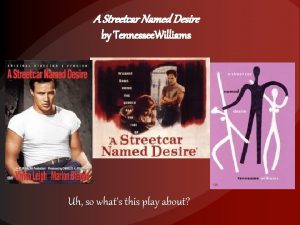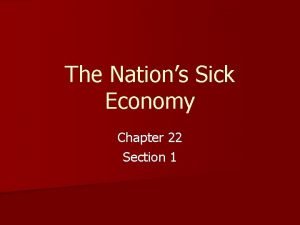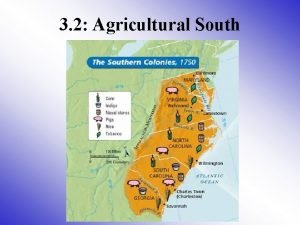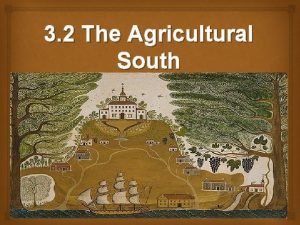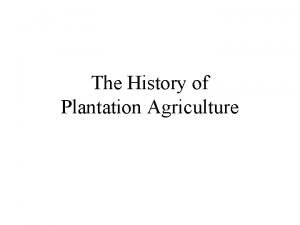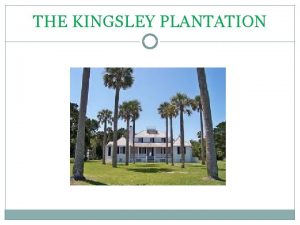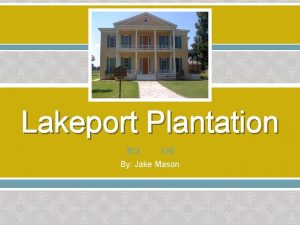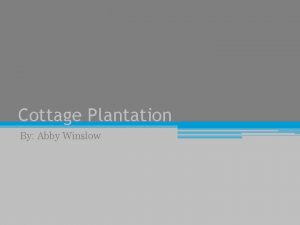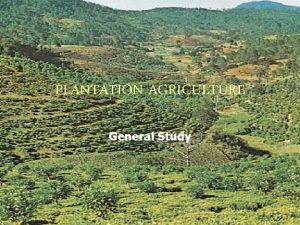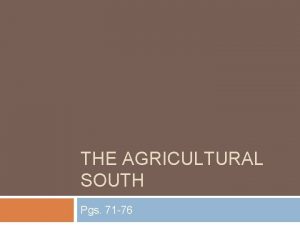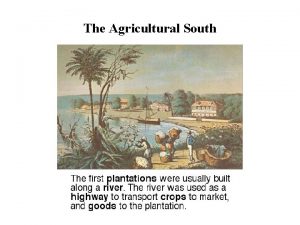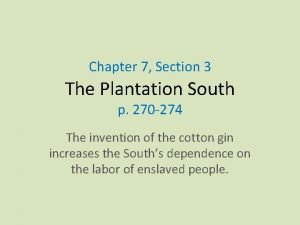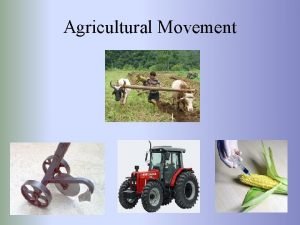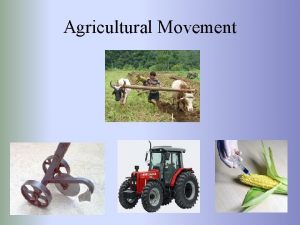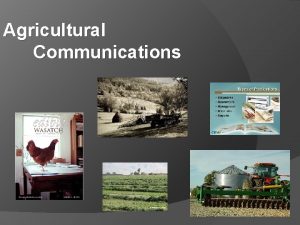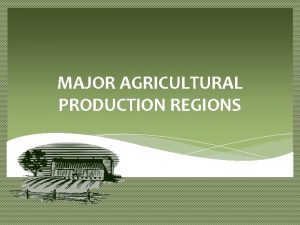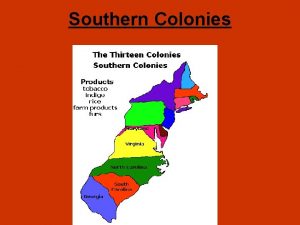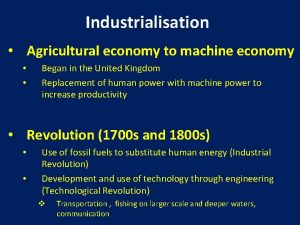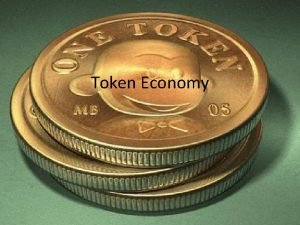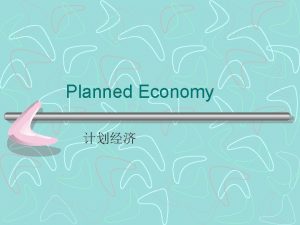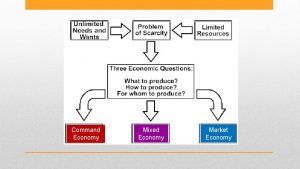Section 2 The Agricultural South Plantation Economy n





























- Slides: 29

Section 2 The Agricultural South

Plantation Economy n n n Plantations grew one single cash crop which was grown primarily for sale rather than the farmer’s own use Plantations along rivers to ship goods directly to the North No need for town with plantations n n n Produced everything they needed Could store goods on plantation Very few cities/towns in the South

Life in Southern Society n Diverse people n n Many Europeans fled to both the North and South – many Germans, Scots-Irish settled in South Prosperous people n n Many small farmers but large plantations owners controlled the economy All southern colonists enjoyed the economic benefits of Southern crops, especially with tobacco along the Chesapeake

Life is Southern Society (cont’d) n Women n Treated as second-class citizens • Could not vote or own property Middle class women spent time cooking or working small tasks on the farm n Planter class (elite) ran the household by handing tasks to servants and managing them n

Life in Southern Society (cont’d) n Indentured servants Mostly white men from prison or poverty n No rights while in bondage n Those who actually paid their debts faced life on the western edge of the southern colonies and barely advanced in society n Reports of hard life discouraged new servants from coming, so colonists turned to slavery for labor needs n

Slavery n Evolution of slavery Native Americans Indentured Servants Slaves (seen as better return for their investment at the time) n European Slave Trade n n Triangular trade – term referring to the exchange of rum from New England to Africa for slaves, whom were transported to the West Indies and sold for sugar and molasses, which was shipped to New England to be made into rum Term is somewhat inaccurate because the trading network was much more extensive

Slavery (cont’d) Middle Passage – voyage that brought Africans to the West Indies and later to North America – considered middle leg of transatlantic trade n Characterized by sickening cruelty n Use of red-hot irons for identification n Whippings/beatings on ship n Disease prevalent on vessel due to unsanitary conditions n

Slavery (cont’d) n Slavery in South Difficult life of bondage with most work taking place in the fields n Some worked on household chores n Small farms worked alongside their owners n Large plantations they were directed by their owners n

Africans Cope Diverse background of slaves but they bonded together for support n Kept African culture alive by: n Weaving baskets n Molding pottery n Music traditions n Oral history n Dance – ring shout n

Slave Resistance and Revolt Individually slaves often faked illness, broke tools, staged work slowdowns n On a group level… n n Stono Rebellion – Sept. 1739 • 20 slaves gathered in Charleston and used guns and weapons to kill several planter families as the fled to Spanish-held Florida until they were captured and many killed or executed • Rebellion led to a tightening of harsh slave laws already in place.

Section 3 The Commercial North

Industry Grows in the North n A diversified economy Several cash crops per farm n Small farms n Crops and industry--crops and lumber n Shipbuilding n Iron ore n Evolving a merchant class of people who became most powerful n

Urban Life n n Society composed of diverse groups-immigrants, African Americans, and women. Influx of immigrants n n Most came as indentured servants from England. By 1755 more than a third coming from other countries. • Germans and Scots largest group. • What problems might this bring with them? n n Crowded Poverty in Cities

Slavery in the North Racial prejudice existed. n Greater legal standing--could sue and be sued, had right to appeal to the highest colonial courts. Unlike the South. n North were considered "less human, " and treated harshly n

Women in the North n n n Extensive work responsibility with few legal rights. (What does this mean? ) Making necessities Only single women and widows could run their own business. Women's work. (nurses, teachers, laundress, seamstress, or servant. Puritan women were under even more restrictions--Biblical dictums. n Wives are to submit to their husbands.

Witch Trials in Salem n n n April 1692 Salem girls made accusations against an African slave by the name of Tituba, of practicing witchcraft. Fear has strange effects and the girls went on to accuse others of witchcraft. To get off those accused tried to save themselves and name others. Hysteria gripped the town and several innocent people met an untimely death at the hands of executioners. Stemmed from unequal economic growth--rich against poor or poor blaming rich in use of witchcraft to gain. Women considered to be too independent. Ended when rational people questioned the evidence and found out the falsities in it.

Enlightenment n n An intellectual movement. Use of scientific method to obtain knowledge n n n Not taking anything for granted or just because they were told what they should believe. Relied on observation and reasoning to determine relationships. Benjamin Franklin obtained truth through experimentation. In some colonies better than 50% of colonial men could read so this information spread quickly. Political effects lead to use of reasoning to come to the conclusion and existence of "natural rights" by T. Jefferson. Ultimately led to the questioning of British authority over the colonies.

Great Awakening n n Decline of church membership due to the great prosperity of some among whom were Puritans who doctrinally would not accept material wealth in the City on the Hill. Jonathan Edwards n n n Wanted to revive the Puritan vision. People must feel their sinfulness and feels god's love for them. A movement for persons to rededicate themselves and their service to God. Lead to people questioning the organized churches teachings. Left the door open for more Congregationalist such as the Baptist, and Methodist. Led to the establishment of several renown colleges to train ministers.

Consequences People to question traditional authority. n The importance of the individual-emphasizing reason, deemphasizing the role of church authority. n Led to the colonist to question Britain's authority over their lives. n

Section 4 The French and Indian War

Rivals for an Empire Why did the colonists want their British brothers during the French and Indian War? n They wanted to expand westward and the French were in the west in the Ohio Valley. n

France’s In North America n 1. 2. 3. 4. 5. Trace the exploration of North America by the French. 1534 Cartier - St Lawrence River 1608 Champlain - Founded Quebec Priests Marquette and Jolliet explored the Great Lakes and Upper Mississippi 1682 Caveliar and La Salle - Explored the Mississippi River claimed the river valley for France naming it Louisiana. Slow growth to occupy the region

French Slow to Occupy Hard to find people who wanted to go and engage in fur trading. n France not interested in occupation, interests was economic n n The economic interests had the French getting along better with the Native Americans

Britain Wins the War n What opened old wounds between Britain and France? French built Fort Duquesne in strategic location n Virginia governor had granted land to wealthy planters n Virginia sent militia to order the French to leave n

Conduct of the War n George Washington at Fort Necessity n n Forced to surrender French win early British general Edward Braddock led the attack were ambushed and fled n Cowardice of British left impression on Washington’s troops better at this kind of warfare n

Conduct of the War n William Pitt and the Iroquois Turn the Tide Under Pitt British troops began to win battles n Winning prompted the Iroquois to join with the British n • Wanted to be on winning side n Plains of Abraham caught French in a surprise attack--Big win for the British

Treaty of Paris n n Great Britain claimed Canada Nearly all land west of Mississippi River Florida taken over from Spain to include the city of New Orleans which the Spanish got from France in 1762 Big losers were the Native Americans who had, except for the Iroquois had sided with the French

Victory = New Problems Use of weapon of mass destructionsmallpox-by the British n Negotiated treaty with British n Proclamation of 1763 n Established a line denying occupation by colonists n Colonists angered by Proclamation n British couldn’t enforce the Proclamation n

Colonies and Britain Grow Apart n n Colonists saw the remaining British troops as an occupying force King George III and George Grenville n n Crack down on colonial smuggling Writs of Assistance-blanket search warrant • Could search colonists homes, ships, etc. angered the colonists n Sugar Act • Vice-admiralty Courts n Acts violated rights as British citizens
 Chapter 11 section 3 the plantation south
Chapter 11 section 3 the plantation south Athenian economy vs sparta economy
Athenian economy vs sparta economy Plymouth plantation summary
Plymouth plantation summary Fox creek plantation
Fox creek plantation Rosswood plantation
Rosswood plantation Plantation human development trust
Plantation human development trust Bellgrade plantation
Bellgrade plantation Pecan plantation population
Pecan plantation population The munster plantation
The munster plantation Ferry hill plantation
Ferry hill plantation Cromwellian plantation
Cromwellian plantation What is georgian tea like
What is georgian tea like Planning plantation
Planning plantation House slaves vs field slaves
House slaves vs field slaves Brightwood plantation in huger
Brightwood plantation in huger Davenport v cotton hope plantation
Davenport v cotton hope plantation Ford plantation ga
Ford plantation ga Forest plantation development sdn bhd
Forest plantation development sdn bhd Old south vs new south streetcar named desire
Old south vs new south streetcar named desire Chapter 22 section 1 the nation's sick economy
Chapter 22 section 1 the nation's sick economy Hình ảnh bộ gõ cơ thể búng tay
Hình ảnh bộ gõ cơ thể búng tay Frameset trong html5
Frameset trong html5 Bổ thể
Bổ thể Tỉ lệ cơ thể trẻ em
Tỉ lệ cơ thể trẻ em Voi kéo gỗ như thế nào
Voi kéo gỗ như thế nào Chụp tư thế worms-breton
Chụp tư thế worms-breton Hát lên người ơi alleluia
Hát lên người ơi alleluia Môn thể thao bắt đầu bằng từ chạy
Môn thể thao bắt đầu bằng từ chạy Thế nào là hệ số cao nhất
Thế nào là hệ số cao nhất Các châu lục và đại dương trên thế giới
Các châu lục và đại dương trên thế giới
